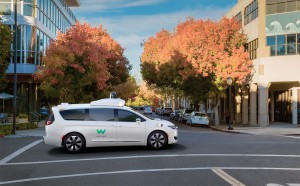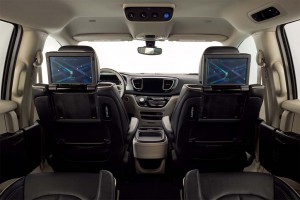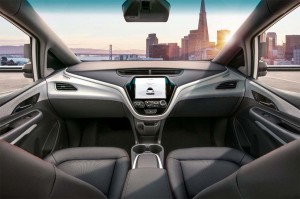
Waymo has been testing its ride-sharing program in Phoenix but plans to launch in other markets as it goes fully driverless.
Waymo plans to buy “thousands” of Chrysler Pacifica Hybrid minivans to be used as Google’s autonomous vehicle spin-off sets up a driverless ride-hailing service in “multiple U.S. cities,” Waymo and Fiat Chrysler Automobiles announced Tuesday.
The announcement marks a significant step forward for both companies. While considered a leader in the field, it had not been clear how Waymo was planning to commercialize its development of self-driving vehicle technology. For its part, FCA has been reluctant to invest in autonomous vehicle research but could now make a big leap by expanding its nascent alliance with Waymo.
“In order to move quickly and efficiently in autonomy, it is essential to partner with like-minded technology leaders,” Fiat Chrysler CEO Sergio Marchionne said in a statement. “Our partnership with Waymo continues to grow and strengthen; this represents the latest sign of our commitment to this technology.”
The two companies first announced an alliance in late 2016, the Silicon Valley spin-off acquiring 100 of the plug-in hybrid vans to use in a pilot ride-sharing research project in the Phoenix area. Waymo subsequently said it would purchase another 500.
(Waymo expanding service to Atlanta. Click Here for more.)
A week ago, it also announced plans to expand its ride-sharing program to Atlanta, even as it has been testing in 25 communities around the U.S. – including Michigan where Waymo hopes to improve the ability of its technology to operate in snowy and icy conditions that might obscure the traffic signs and markers its technology normally relies upon.
“With the world’s first fleet of fully self-driving vehicles on the road, we’ve moved from research and development to operations and deployment,” Waymo CEO John Krafcik said in the statement. “The Pacifica Hybrid minivans offer a versatile interior and a comfortable ride experience, and these additional vehicles will help us scale.”
For the moment, Waymo isn’t offering details of its plans, including how it will make a commercial business out of driverless ride-sharing, though it did indicate it will operate in numerous locations. Precisely where will depend, at least for the moment, on what states have authorized the use of completely driverless vehicles on public roads. That is still limited to seven states, though Congress is debating a measure that, if enacted, would open up the rest of the country to potentially tens, and even hundreds of thousands of such vehicles.
Delivery of the new vans will begin late in 2018 and will require extensive conversion work before they are actually ready to operate publicly.
With plans to commercialize its technology, Navigant Research has now listed Waymo as one of the top three players in self-driving technology, along with General Motors and an alliance between Germany’s Daimler, the parent of Mercedes-Benz, and auto supplier Bosch.
A year ago, it wasn’t clear what Waymo’s strategy would be, said Navigant Research analyst Sam Abuelsamid. “They needed to establish a relationship with a manufacturer to provide them with vehicles. They said they didn’t want to get into the manufacturing side because they know how difficult that can be.”
On top of the expanding partnership with FCA, Waymo has also set up relationships with both Avis and AutoNation to support and maintain its ride-sharing fleet.
Abuelsamid said he expects that the Waymo ride-sharing service will officially launch “within months” of a similar venture General Motors has said it aims to debut in 2019 using a modified version of its Chevrolet Bolt battery-electric vehicle. Other players looking to get into the driverless mobility services business include the two largest of today’s ride-sharing companies, Uber and Lyft.
The technology is expected to help slash the cost of hailing a ride, now estimated at about $1.40 a mile, according to data gathered by the Toyota Research Institute – which is also hoping to enter the field. By comparison, the cost of owning and operating a private vehicle is about $0.85 a mile. Travis Kalanick, the founder and former CEO of Uber had predicted that by removing the driver the cost of his service would come down so dramatically it would, for millions of Americans, replace private vehicle ownership.
A recent study by the Boston Consulting Group forecast as much as a quarter of the miles Americans travel by car in 2030 will be in driverless ride-share vehicles.
(GM sued after crash involving self-driving Chevy Bolt. Click Here for more.)
But Navigant’s Abuelsamid cautioned that companies like Waymo and Uber still have to prove the viability of their business plans. They also need to convince the public it will be safe to rely on driverless vehicles.
A series of recent studies, including one by AAA and another by Reuter’s-Ipsos, found that the majority of Americans still say they wouldn’t feel safe inside a vehicle without a driver – even though proponents of such technology contend that self-driving vehicles will eventually be able to eliminate highway crashes, injuries and fatalities.
(California Gov. wants 5 mil zero-emissions vehicles on the road; ready to spend $2.5 bil to get there. Click Here for the story.)



Driverless cars are a joke. Death traps
Wham-o!!